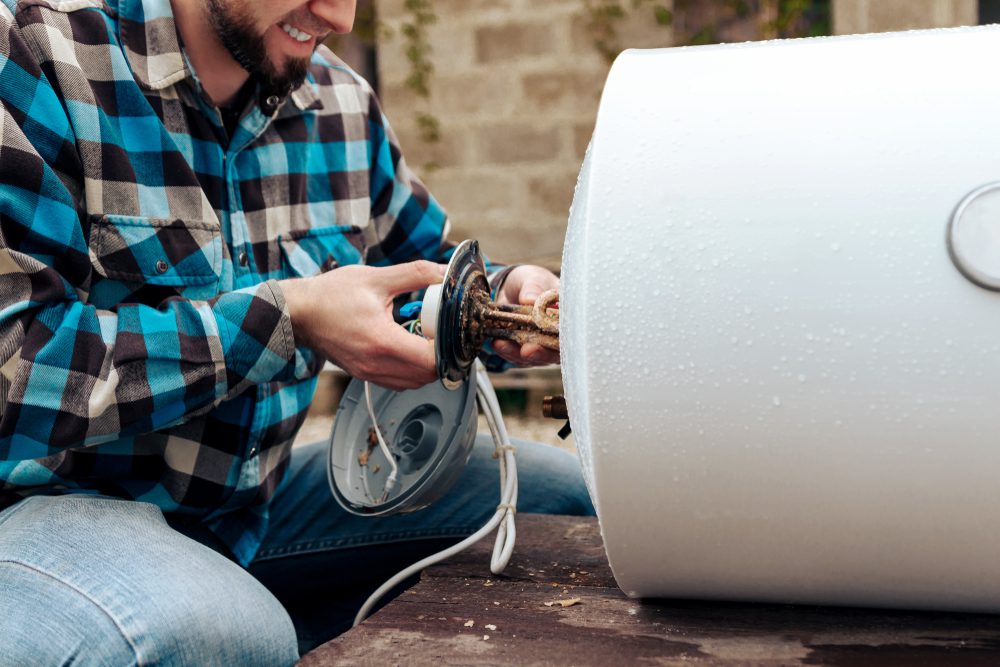Ways to Cope with the Major Hot Water Heater Urgencies
Ways to Cope with the Major Hot Water Heater Urgencies
Blog Article
What're your insights and beliefs on Is Your Water Heater Leaking??

A water heater is one of one of the most crucial fundamental home appliances that can be located in a house. With hot water heater, you do not need to go through the anxiety of home heating water by hand every single time there is a need to take a bath, do the laundry, or the dishes. However, there is always a possibility that your hot water heater would act up as with most mechanical devices.
It is very important to note any little breakdown as well as tackle it quickly prior to things get out of hand. Most times, your hot water heater starts to malfunction when there is an accumulation of sediments as a result of constant usage. As a safety measure, periodic flushing of your hot water heater is recommended to avoid sediment buildup and also prevent practical failing.
Usual water heater emergency situations and exactly how to manage them
Dripping water heater tank.
A leaking tank could be a sign of rust. It might trigger damage to the flooring, wall and electric devices around it. You might also be at risk of having your apartment or condo swamped. In this circumstance, you ought to shut off your hot water heater, enable it to cool off, as well as very carefully try to find the source of the trouble. Sometimes, all you require to do is to tighten a few screws or pipeline links in cases of minor leaks. Yet if this doesn't function as well as the leak lingers, you may need to use the solutions of a professional for an ideal replacement.
Changing water temperature level.
Your water heating unit can begin producing water of various temperature levels typically ice scalding or cool hot. There may be a need to replace either the thermostat or the heating system of your water heating system.
Too little warm water
It may be that the water heating system can't support the warm water need for your house. You can update your water heating unit to one with a larger capacity.
Tarnished or smelly water
When this happens, you need to recognize if the concern is from the water or the storage tank source. If there is no funny scent when you run cold water, after that you are particular that it is your water heater that is faulty. The smelly water can be created by corrosion or the accumulation of microorganisms or sediments in the water heating system storage tank.
Verdict
Some property owners neglect little caution as well as minor faults in their hot water heater unit. This only results in more damage and also a possible complete break down of your appliance. You should handle your hot water heater faults as soon as they come up to stay clear of even more expenditures and unnecessary emergency problems.
With water heaters, you don't require to go via the anxiety of heating water by hand every time there is a need to take a bathroom, do the washing, or the recipes. Your water heating unit could start producing water of different temperature levels normally ice cold or hot warm. It might be that the water heating unit can't sustain the warm water demand for your house. If there is no funny scent when you run cool water, after that you are specific that it is your water heating unit that is defective. The stinky water can be caused by corrosion or the build-up of microorganisms or sediments in the water heating system tank.
Common Water Heater Issues and What You Should Do
What Type of Water Heater Do You Have?
Before we begin it’s first important that you identify the type of water heater you have on your property. There are two main types of water heaters out there: conventional and high efficiency.
Both of these types of products typically use either gas or electricity to heat power. There are also solar water heaters that use a thermal collector on the roof or yard to heat the water.
While these models are not as common, they can cut heating costs in half. In this article, we will focus on conventional and high efficiency.
How Do My Electric and Gas Water Heater Work?
Though they look similar, electric and gas water heaters work very differently. It’s important to know their basic function because often problems can be specific to the heating source.
In the electric model, a thermostat on the side of the machine detects the temperature of the water in the tank. When the temperature needs to rise electricity flows to a heating element suspended in the water.
Gas models also use a thermostat device — typically with a mercury sensor at the tip and an additional sensor called a thermocouple. The thermocouple detects whether the pilot light is on and controls the flow of gas.
When the thermostat drops below the appropriate level gas is released which becomes ignited by the pilot light. The flame heats the bottom of the water tank which causes hot water to rise and cold water to drop.
This natural circulation continues until the water reaches the desired temperature. Then, the thermostat triggers the gas control valve to shut off the flow of gas.
What Are the Most Common Issues and How Do You Fix Them?
https://happyhiller.com/blog/common-water-heater-issues-and-what-you-should-do/

Hopefully you liked our topic about Is Your Water Heater Leaking?. Thanks for spending some time to read through our post. Those who enjoyed reading our page please make sure you remember to share it. We treasure reading our article about Common Hot Water Heater Problems.
Water trouble? Dial. Report this page